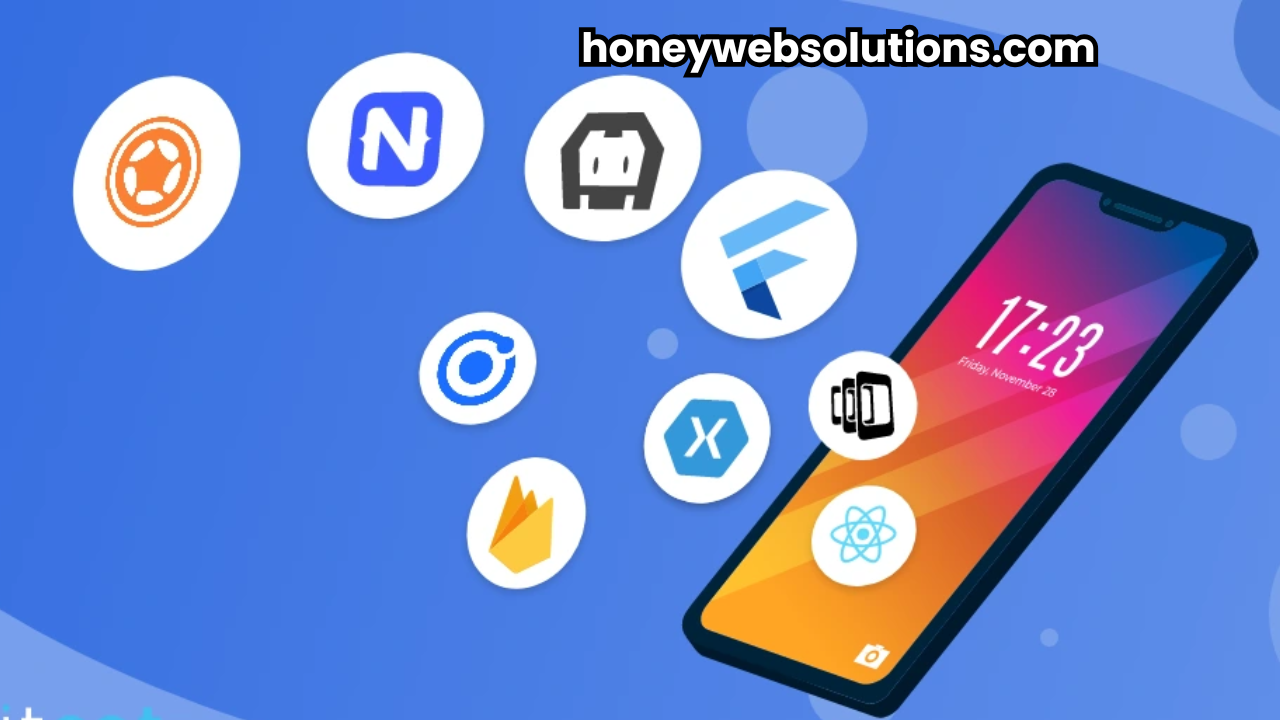
6 Best Tools for Building Cross-Platform Mobile Apps
Introduction
Table of Contents
In today’s fast-paced digital world, businesses and developers require efficient solutions to build mobile applications that work seamlessly across multiple platforms, including iOS and Android. Cross-platform mobile app development tools enable developers to write code once and deploy it across different operating systems, saving time and resources.
If you’re searching for the best tools to build cross-platform mobile apps or wondering which framework is best for mobile app development, this guide will help you make an informed decision. Below, we explore six top tools used by developers to create high-performance cross-platform mobile applications.
1. Flutter
What is Flutter?
Flutter, developed by Google, is an open-source UI software development kit (SDK) that allows developers to build natively compiled applications for mobile, web, and desktop from a single codebase.
Key Features:
- Uses Dart programming language
- Provides a rich set of customizable widgets
- Features hot reload for fast testing and iteration
- Offers native performance with high rendering speeds
Why Choose Flutter?
- Ideal for building aesthetically pleasing apps with smooth animations
- Supports cross-platform app development with a single codebase
- Backed by Google with a growing developer community
Best for:
- Startups and enterprises looking to create visually engaging apps
- Developers searching for high-performance UI tools
2. React Native
What is React Native?
React Native, created by Facebook, is a popular framework that enables developers to build mobile applications using JavaScript and React.
Key Features:
- Utilizes JavaScript and React for development
- Offers hot reloading for quick code changes
- Provides native-like performance using native components
- Large community support and extensive third-party libraries
Why Choose React Native?
- Code reusability across multiple platforms
- Easy integration with existing apps
- Strong community with numerous open-source contributions
Best for:
- Businesses looking to develop cost-effective apps
- Developers familiar with JavaScript and React
3. Xamarin
What is Xamarin?
Xamarin, owned by Microsoft, is a framework that allows developers to build cross-platform mobile apps using C# and .NET.
Key Features:
- Uses C# and .NET for development
- Provides access to native APIs
- Integrates with Microsoft Visual Studio
- Offers performance optimization through compiled code
Why Choose Xamarin?
- Seamless integration with Microsoft ecosystem
- Native-like performance with minimal overhead
- Suitable for enterprise-grade applications
Best for:
- Enterprise developers using Microsoft tools
- Apps requiring extensive API integrations
4. Apache Cordova
What is Apache Cordova?
Apache Cordova is an open-source mobile development framework that enables developers to build applications using HTML5, CSS3, and JavaScript.
Key Features:
- Supports HTML, CSS, and JavaScript
- Provides access to native device features via plugins
- Enables deployment across multiple platforms
- Large library of third-party plugins
Why Choose Apache Cordova?
- Easiest transition for web developers
- Quick development cycles
- Ideal for simple apps with basic functionalities
Best for:
- Web developers looking to enter mobile development
- Basic cross-platform applications
5. Ionic
What is Ionic?
Ionic is a powerful framework for developing cross-platform mobile apps using HTML, CSS, JavaScript, and Angular.
Key Features:
- Built with HTML5, CSS, and JavaScript
- Uses Capacitor and Cordova plugins for native functionalities
- Offers a library of pre-built UI components
- Provides progressive web app (PWA) support
Why Choose Ionic?
- Simple learning curve for web developers
- Beautiful UI components available out-of-the-box
- Supports progressive web apps (PWAs)
Best for:
- Developers with web development experience
- Apps requiring lightweight performance and quick prototyping
6. Unity
What is Unity?
Unity is a cross-platform development engine primarily used for building mobile games and interactive applications.
Key Features:
- Supports C# and .NET
- Advanced 3D and 2D game development capabilities
- Integrates with AR/VR platforms
- Extensive asset store for pre-built resources
Why Choose Unity?
- Best for gaming applications
- Powerful graphics rendering engine
- Cross-platform deployment for Android, iOS, and more
Best for:
- Game developers and interactive content creators
- Augmented reality (AR) and virtual reality (VR) projects
Conclusion
Choosing the right cross-platform mobile app development tool depends on your project’s requirements, programming expertise, and desired app functionalities.
- If you need high-performance UI and animations, go for Flutter.
- For JavaScript developers, React Native is the best choice.
- Xamarin is ideal for enterprise applications integrated with Microsoft.
- Apache Cordova is great for web developers transitioning to mobile apps.
- Ionic is excellent for lightweight applications with a strong UI.
- Unity is the go-to option for game and AR/VR developers.
With the right tool, you can build a feature-rich, responsive, and scalable mobile application that delivers a seamless user experience across platforms. So, analyze your requirements and start developing your next cross-platform app today!
Frequently Asked Questions (FAQs)
1. What is the best cross-platform mobile app development framework?
Flutter and React Native are the top choices for most developers due to their efficiency and strong community support.
2. Is cross-platform development better than native development?
Cross-platform development is cost-effective and time-saving, while native development offers better performance and customization.
3. Can I use Python for cross-platform mobile app development?
Yes, tools like Kivy and BeeWare allow Python-based mobile app development, but they are less popular than Flutter and React Native.
4. Which framework is best for mobile game development?
Unity is the best framework for mobile game development due to its powerful rendering engine and cross-platform capabilities.
5. How do I choose the best mobile app development framework?
Consider factors like performance, ease of use, programming language, third-party integrations, and community support before making a choice.










